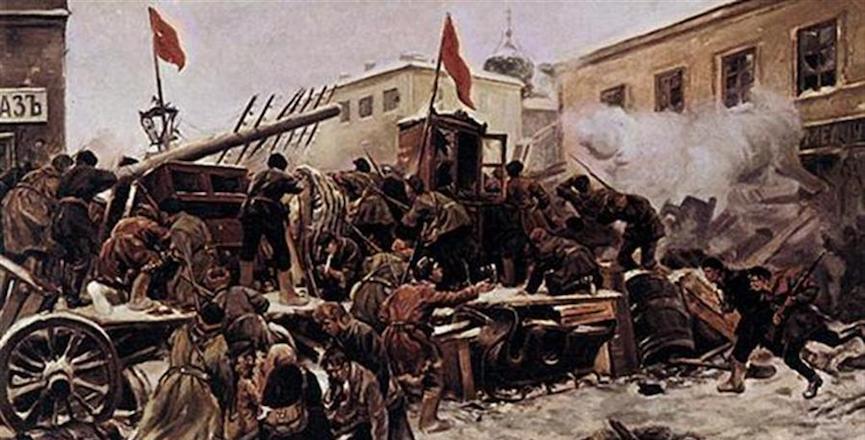Birthdays are easy. Everyone gets celebrated once a year, especially kids, not for anything they did but just for existing. It’s one of the kindest human innovations. Well done, people.
Historical commemorations, on the other hand, are complex. It’s odd being in Russia, where I now am — particularly in St. Petersburg, formerly Leningrad — during this centenary of Russia’s Revolution. One hundred years since what?
This is a generally problematic time for historical markers, including our own 150th. Canada in 1967, by contrast, was a piece of (birthday) cake: just go to Montreal and celebrate. This year’s party is fraught, mostly due to issues raised by Indigenous peoples.
But Russia has its problems, too, a century after the Communist revolution that shook the world, now visible, if at all, in the rearview mirror. How do you salute that upheaval, without glorifying or denying it?
It helps that the centre of it, Red Square in Moscow, predates the reds. Today, St. Basil’s Cathedral still dominates one side. Worship recommenced there in 1997. The GUM department store comprises another side, a cathedral of consumerism and posh global brands. Facing it, across the square, is the Kremlin and that famed mausoleum, where visitors line up for hours to file by a rather minuscule, recumbent, embalmed Lenin. It all gets drawn together: church, commerce, state. Then, now, revolution, its aftermath.
It also helps to have a breathtaking historical perspective. That nearly-a-century of Communism fairly swiftly turned into another epoch in the long arc of Russian history: an aberration and effort to break in a new direction but also a continuation — of empire, autocracy and Czarism, albeit remodelled.
Or consider Fallen Monument Park near the river: a vast assortment of statuary of Lenin, Stalin (often with nose defaced), Marx, Brezhnev, all seeming randomly popped down, in some cases lined up by size as if ready to be inserted into each other like Matryoshka dolls.
It’s a way to defuse your disconcerting past, not by banning or demolishing it (like airbrushing Trotsky off the reviewing stand) but by scattering it casually yet availably, letting it settle in as just one more era in your overflowing past: there’s Dzerzhinsky, the KGB’s founder, and a huge Soviet emblem, among clusters of conceptual sculpture.
History needn’t be so confounding if you assume perplexity and confoundment are its essence. Take Fred Weir, a genial Canadian journalist living here. He came in the 1980s, as correspondent for the Tribune, the paper of Canada’s Communist party. His dad and uncle were among the party leaders. He came, initially, for the revolution. Within brief years the Gorbachev reforms erupted, then collapsed. It seemed so intense and intricate, he says, yet looking back it was over in an instant. He’s glad his dad and uncle didn’t live to see the failure and disappointment.
Yet he stayed, for decades now, working for papers with reputations for fine international coverage, like the Christian Science Monitor. Married here, has two grown kids. He’s completely comfortable, who’d have expected that, in the aftermath of Communism, which he’d journeyed to witness. He says this may be Russia’s most liberal era ever, though he says it with full awareness of the conflicts, contradictions, repression, violence and the rest. Maybe his Marxist past prepared him for the bewildering mix. You go with the flow, or dialectic.
The Bolsheviks, under Lenin, seemed to win their bet about seizing power a century ago. Even Trotsky, who had been an opposing Menshevik, went over. He was a complex fellow, described in possibly the best novel ever on that whole experience: Leonardo Padura’s The Man Who Loved Dogs. Maybe Trotsky just couldn’t resist the action, rather than waiting for history to catch up.
I mean, who really wants to be a “slow revolutionary?” Yet the cautious Mensheviks, as someone said, might’ve had a point. Allow the bourgeoisie their moment. Work with them, aim at (mere) reforms: jobs, wages, health care, schools. But would the rich and mighty ever go along with that, or would they, as Marxists used to say about every ruling group, cling to their privilege and need to be dislodged? Dislodged how? By any means necessary. And hey — you’re back to Bolshevism.
The arc of history is long, as Dr. King said, even if it bends toward freedom. But the circle of history, which returns to where it began, can look pretty extensive too.
This column was first published in the Toronto Star.
Image: Wikimedia Commons
Like this article? rabble is reader-supported journalism. Chip in to keep stories like these coming.




